Oil in the Congo Basin: A Carbon Sink Under the Hammer
Location:
Democratic Republic of the Congo, Republic of the Congo
Project risks:
Environmental Destruction, Social Harm
approximate location
The Congo Basin is under the hammer. In the Democratic Republic of the Congo (DRC), an oil auction is opening up vast areas of the Congo rainforest for oil drilling. If fossil fuel companies start extracting oil in the Congo Basin, the effects would resonate deep into the rainforest and around the globe. A Congo Basin oil spree could turn one of the world’s largest carbon sinks into a climate killer. It could leave humans’ closest living relative, the bonobo, homeless. It would represent an economic gamble that people in Congo's forests and across the world fiercely reject.
The Congo Rainforest Under the Hammer
In Spring 2025, the DRC government put licenses for 52 new oil and gas blocks all across the country up for sale.23302 The oil blocks cover an area larger than South Africa.23303 Oil blocks now span across 64% of the remaining intact rainforest in the country. 15 of the blocks overlap with protected areas, including nearly three quarters of the flagship Kiivu Kishasa Green Corridor conservation project.23304 The DRC government is eager to invite fossil fuel companies in, but until now has not been successful. In 2022, it launched tenders for 30 oil and gas blocks. The auction was called off in October 2024 following more than two years of controversies. Only half a year later, a massive expansion of potential oil exploration areas was back on the table.2330523306 The new round covers most of the area from the 2022 auction as well as big new swaths of rainforest.
The DRC’s oil auction is opening the doors for fossil fuel companies to the Congo Basin rainforest, the second largest rainforest on earth.14857 The forest straddles six countries.14855 It stretches from the African Great Lakes in the east to the Gulf of Guinea in the west. The largest part of the Basin lies in the Democratic Republic of the Congo. Through the Basin flows the world's deepest river, the Congo River. Along its banks lie savannahs, swamps, peatlands and old-growth forests. It is the only river in the world to cross the equator twice. Thousands of different plant and animal species live here. Many of them cannot be found anywhere else on the planet.14859 Okapis, the so-called forest giraffes, wander through the dense rainforest. Bonobos climb in the trees. More than 98% of bonobo DNA is identical to human DNA.14861 The Congo Basin is their only home.15503
Notes on methodology: Reputational risk projects on GOGEL are updated annually. This article was last updated November 4, 2025. None of the companies on the Global Oil & Gas Exit List are currently involved in the Congo Basin. However, the risk of oil and gas drilling is high. The new oil auction announced in 2025 is likely to attract interest form fossil fuel companies.
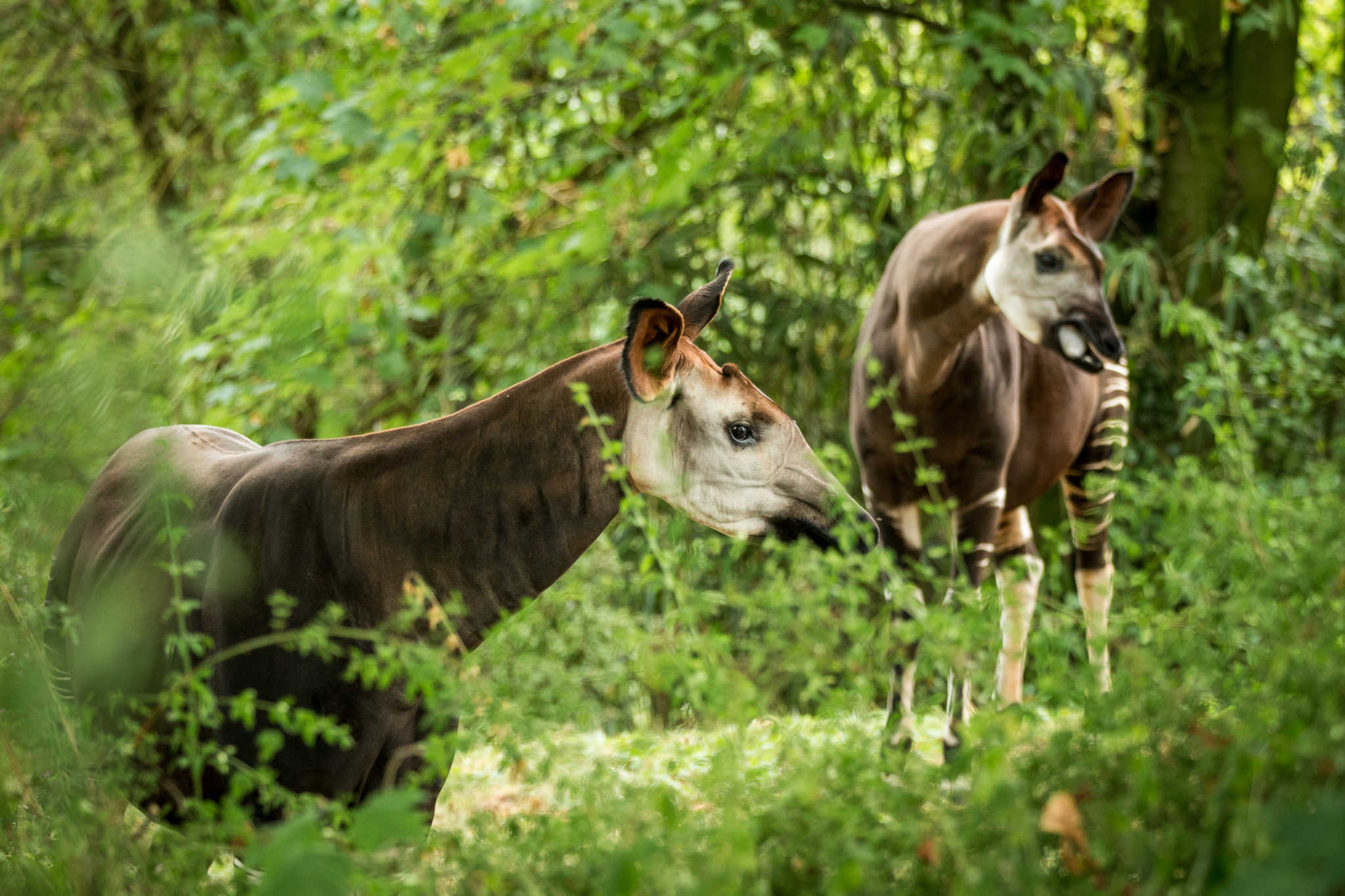
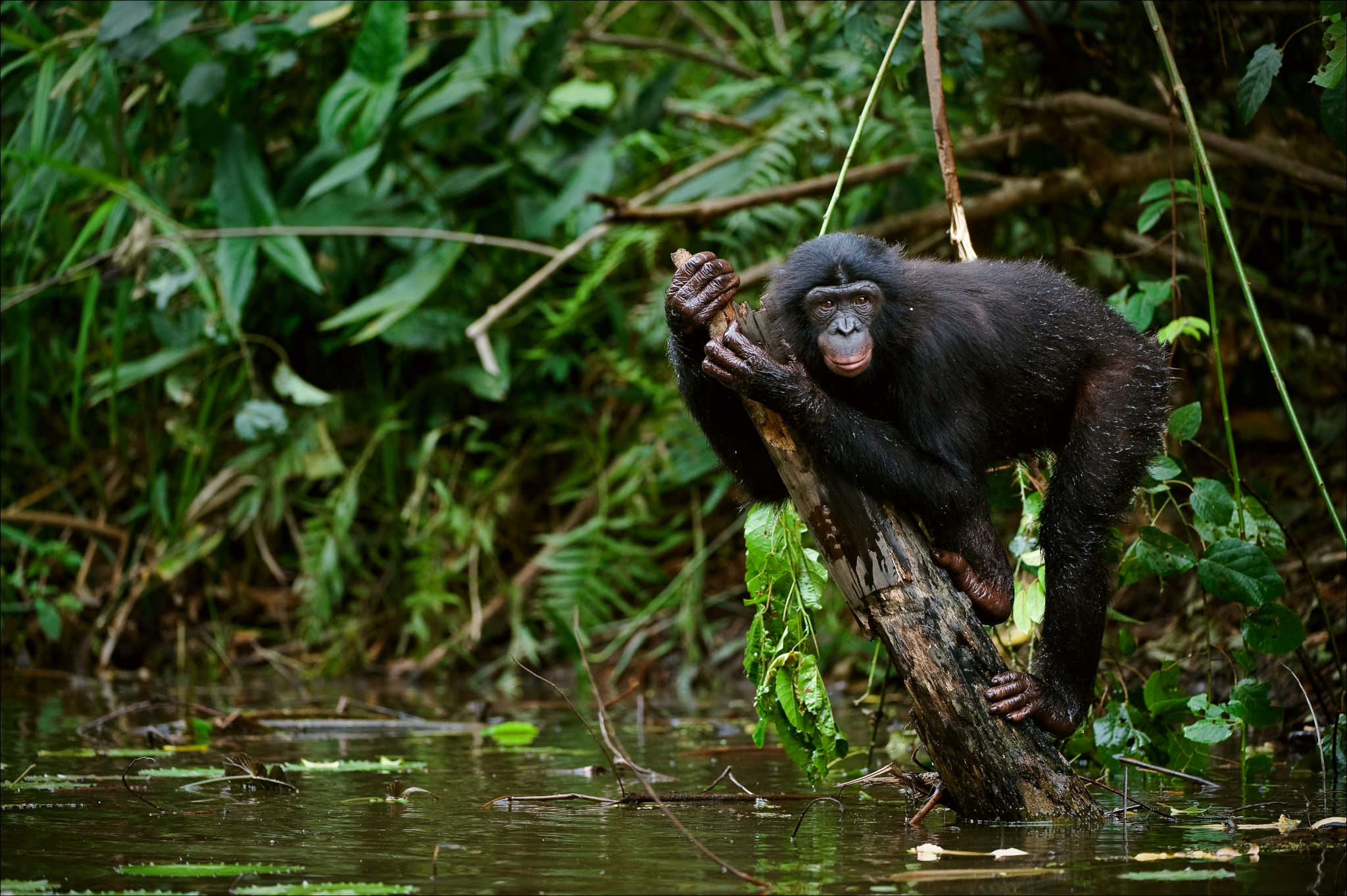
The Congo rainforest supports the livelihoods of around 80 million people throughout Central Africa.14863 Approximately 40 million people live in the forest.14865 Among them are an estimated 500,000 Indigenous people.14867 The Mbuti, Baka, Batwa and other Indigenous peoples often live nomadic lives. They move around the rainforest several times a year.1486914867 For many of them, the forest is more than just the place where they live: it is their spiritual ground thatconnects them with their ancestors.14871
Most local people have no say in the oil plans. In 2022, a report highlighted the concerns of local people who lived in four of the oil blocks that were up for auction.14845 Several of the communities live in areas covered by the new auction round as well.23307 In some of these areas, hardly any roads, hospitals, schools or mobile phone networks exist. Many families collect their drinking water from rivers and earn an income from farming, fishing and hunting. They depend on healthy ecosystems and clean rivers. An oil spill in these areas could ruin their harvest and poison their only source of drinking water. Many people worry that the oil companies will take their land, chase them away and fuel tensions in the already conflict-ridden country. In the country’s only active oil block on the DRC coast, the Anglo-French company Perenco has been contaminating soil and water with oil spills and poisoning communities with toxic gases for more than 15 years.1487314875 Villagers affected by the most recent auctions fear that their home could face the same fate.14845
Dubious Companies
A significant motive for the 2022 auction’s cancellation were allegations of corruption surrounding the process. Alfajiri Energy, the company that won the Lwandjofu gas block auction, was set up 16 days after the auction’s announcement – despite local law requiring three years of financial statements for a company to be considered eligible.21409 The company’s official address is a suburban home in Calgary, Canada, and as of a December 2022 report made by the DRC’s government to assess bidders’ suitability, it only counted three members of staff available for the project.21410 Although Alfajiri Energy scored the lowest of three bidders for the block in the December report, a subsequent version arose in which it received the highest score.21411 Soon after, the company was declared the winner of the Lwandjofu gas block in Lake Kivu. The 3 gas blocks on Lake Kivu were the only blocks not mentioned in the government’s announcement cancelling the auction.21412 It is not clear if they will end up in Alfajiri Energy’s control. Lake Kivu is considered to be at high risk of limnic eruption, a rare phenomenon in which high concentrations of methane and CO₂ dissolved in the water can explode if disturbed.21413 The gas plumes displace oxygen, which suffocates breathing organisms in its vicinity.21414 A limnic eruption at Lake Nyos in Cameroon killed around 1,700 people in 1986.21415 Now, a company with no prior experience could be entrusted with extracting methane from the depths of Lake Kivu, in one of the most densely populated areas in the region.21416
Drilling in the World’s Carbon Storehouse
When oil and gas companies drill in the Congo rainforest, they also jeopardize the carbon storehouse in the rainforest’s soil: peat. Peat comes in thick layers of brown soil-like material in the ground. It forms over thousands of years as dead plants sink to the bottom of the swampy parts of the forest. Unknown to many, peat is enormously efficient at storing carbon. Peatlands cover only 3 percent of the Earth’s surface, but they hold more carbon than any other type of vegetation.14877 If they dry up, the carbon peatlands store is released into the atmosphere.Scientists from around the world are urging decision makers to protect these vital wetlands..14879
The peatlands of the Congo Basin are at the global frontier of climate change. They are the largest tropical peatland complex in the world. Scientists estimate that they hold 31 billion tons of carbon.14881 This is about as much carbon as global fossil fuel combustion causes over a timespan of three years.14883 The peatlands of the Congo Basin have helped regulate the world’s climate without disturbance from industry or infrastructure for thousands of years.14883
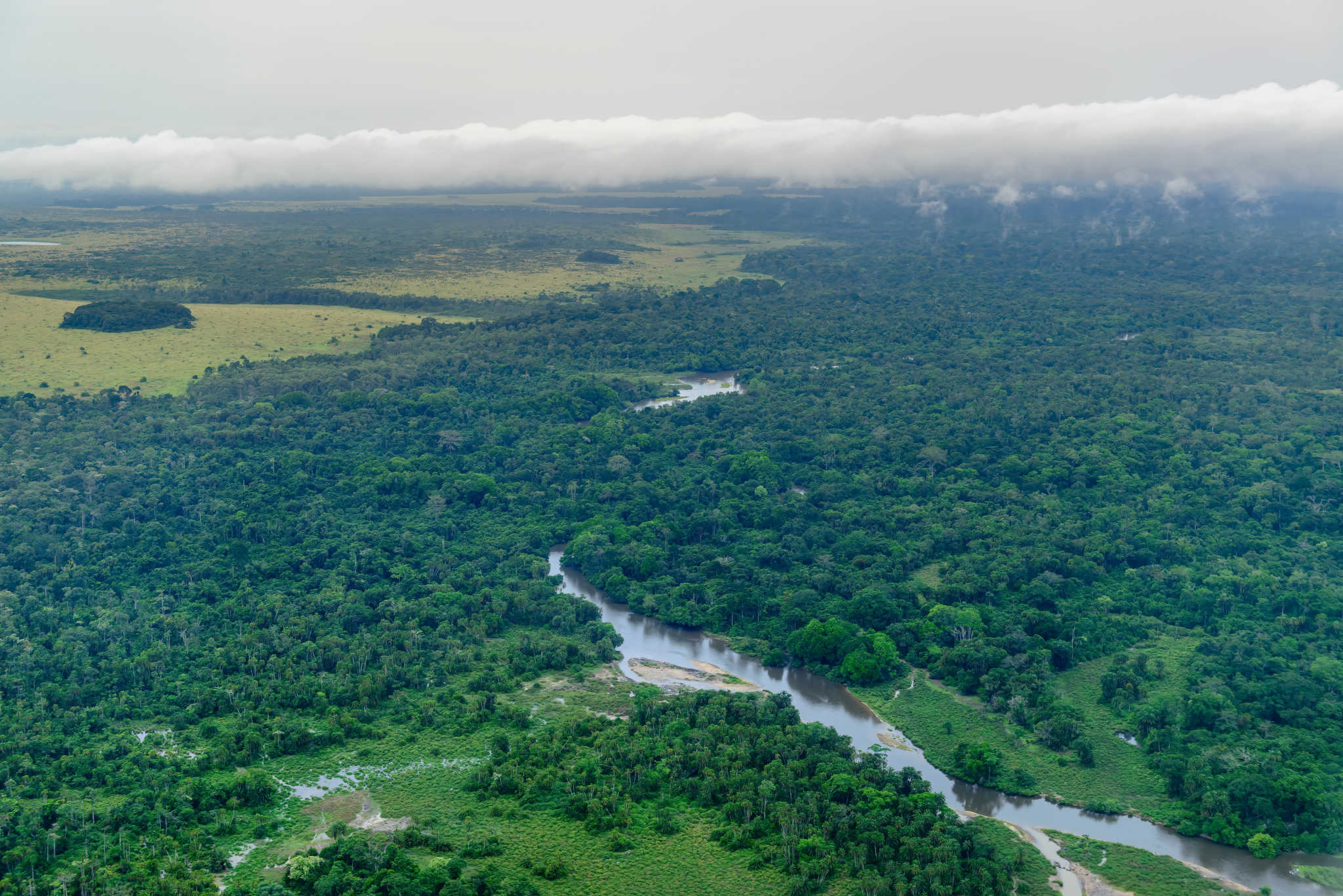
To extract oil, companies would need to cut down the trees in the rainforest, drain the wetlands and build roads and other infrastructure. In the process, they would dry up the peat and release the carbon stored within it, resulting in oil produced with a staggering carbon footprint.14885
Destroying Rainforests and Peatlands for Nothing?
It is not clear if there is much oil under the vulnerable Congo rainforests and the vital carbon sink of the peatlands23308. So far, there has not been one example of successful oil production in the Congo Basin. In those parts of the peatlands that stretch across the border into the neighboring Republic of the Congo (ROC), oil companies have been sitting idly on their oil blocks for years. Until July 2023, Eni and Société Nationale des Pétroles du Congo (SNPC) held oil licenses in the peatlands of ROC.14887 Contrary to what the companies had hoped, oil production never took off. TotalEnergies also held an exploration license in the ROC's peatlands but handed it back to authorities in 2021.14889
As of summer 2025, the only company that has drilled in the Congo Basin is Petroleum Exploration and Production Africa (PEPA). In 2019, PEPA drilled an exploration well in the Ngoki block and announced a massive find. However, industry experts doubt that PEPA’s figures are plausible. Some believe that PEPA tried to lure investors into financing oil projects in the region.14887 PEPA has not announced further progress since it drilled the exploration well in 2019.
Virunga Spared Following Massive Protests
There are some significant differences between the current and previous oil auctions in the DRC. Notably, the Virunga National Park has been spared in the 2025 iteration, despite an overall expansion of the oil exploration area. Set up under Belgian colonial rule, the park is widely known for its rich wildlife. This UNESCO World Heritage Site is home to rare and endangered species, such as the mountain gorilla. While Indigenous people and local communities were forced to leave the national park for the sake of “conservation”, oil companies have been invited in. The Virunga National Park is home to of third of all endangered mountain gorillas in the world.23309
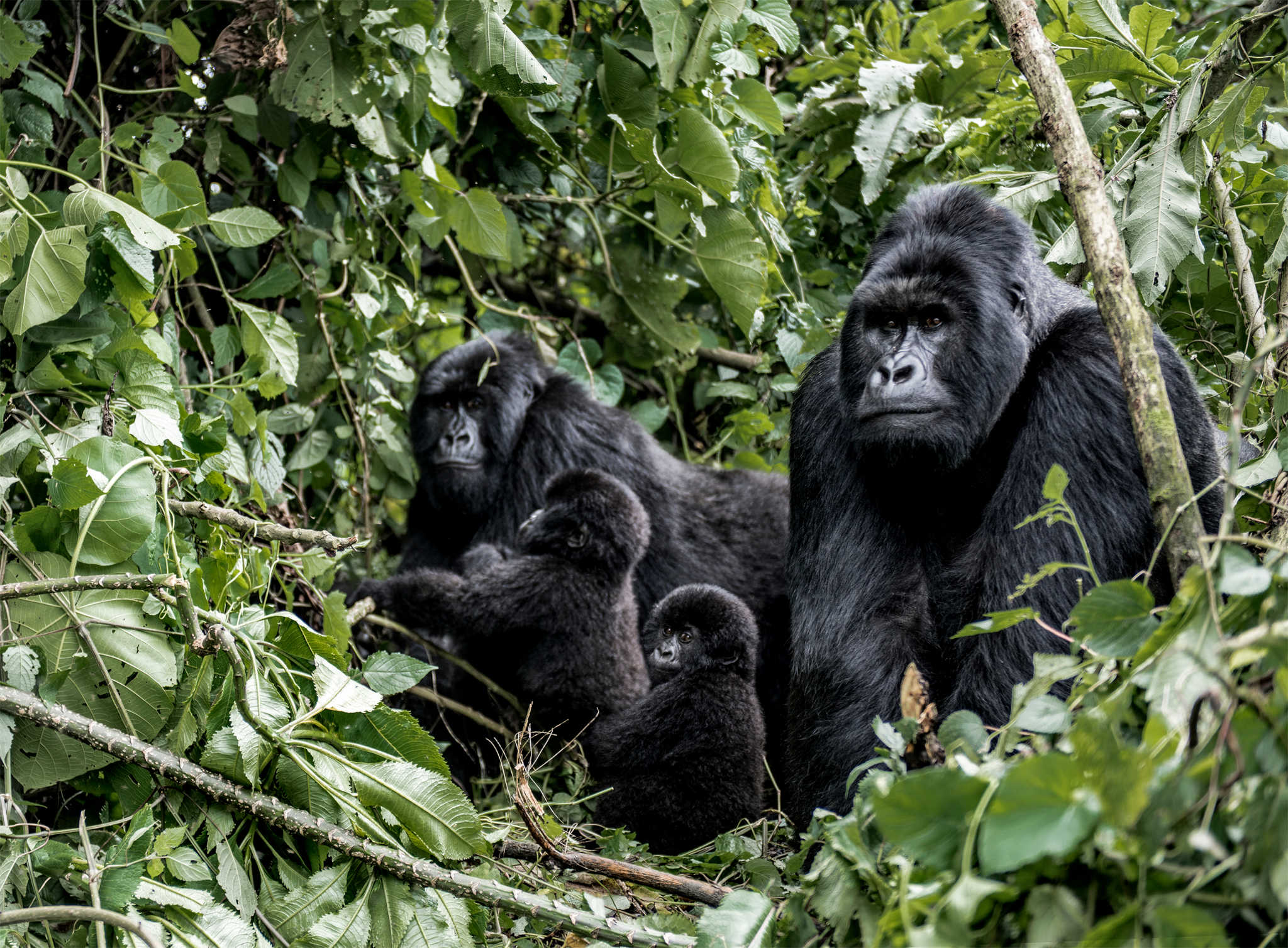
Huge protests in the past are likely part of the reason why the park has been spared in the newest auction. In 2010, SOCO International, a British oil company today known as Pharos Energy, began searching for oil in the Virunga National Park. In this region already torn by Indigenous displacement and conflicts with armed rebel groups, SOCO’s quest for oil unleashed a new level of violence.14891 Local people and rangers who worked to protect Virunga were arrested, tortured and killed.14897
Women and fisherfolk from the area were the first to protest against the oil company. Their movement soon turned into a global wave of resistance.14899 Hundreds of thousands of people around the globe petitioned against SOCO.14901 The British government, Nobel Peace prize winner Desmond Tutu and financiers joined the calls. The Church of England divested GBP 1.6 billion from the British company.14903 In 2014, SOCO gave in to public pressure and abandoned its plans to drill for oil in the Virunga National Park. TotalEnergies, who at that time also held exploration rights in the area, also gave in and pledged not to explore for oil in the Virunga National Park.14905 The historic resistance against oil exploration in the Virunga National Park should be a lesson to international companies hungry for oil in the Congo Basin.
Expect Resistance
Nearly a decade after the collapse of SOCO’s plans, environmental defenders and local people are still prepared to fight for the forests, animals and peatlands in Virunga and the rest of the Congo Basin. In 2022, more than 100,000 people petitioned to halt the opening of the Congo Basin to oil production. They called the plans an “unmitigated disaster for the climate, biodiversity and local people.”14907 Already in 2019, a coalition of African civil society organizations urged international companies to refrain from exploiting fossil fuels in the peatlands. They also pushed investors to stay away from financing projects that overlap with the peatlands of the Congo Basin.14909 As the fossil fuel industry takes further steps to exploit oil there, civil society’s call is as persistent as ever before. In several open letters, Congolese civil society organizations, youth movements and Indigenous peoples demanded that the DRC government halt the oil and gas auction.21418 They are building a strong network of local and international groups to oppose the fossil fuel industry’s surge on their homes and forests.21419
So far, oil companies’ attempts to turn the Congo Basin into an oil production zone have failed. Environmental defenders kept fossil fuel companies out of the Virunga National Park. They will continue to fight for healthy rainforests, undisturbed peatlands and a fossil-free Congo Basin.
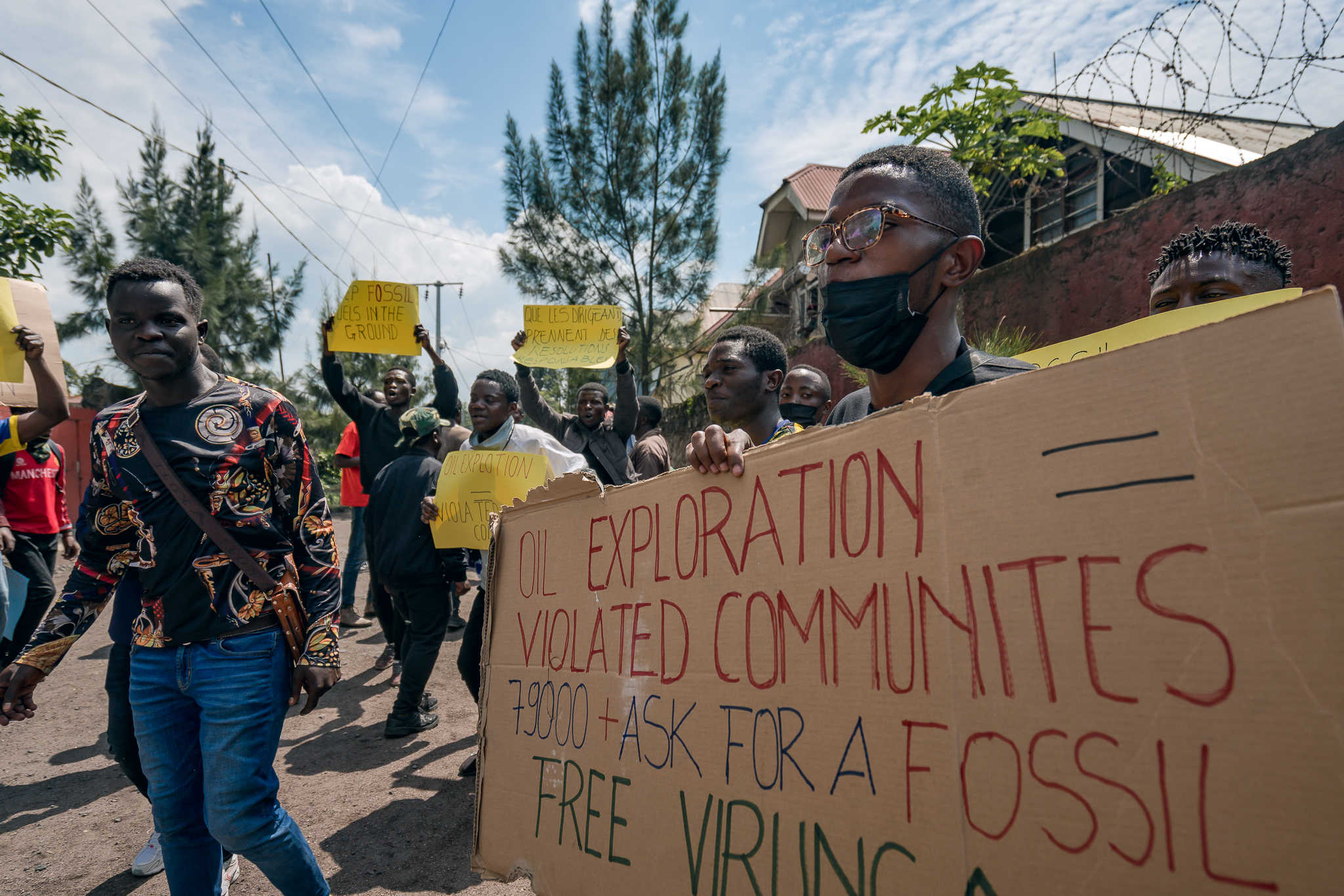
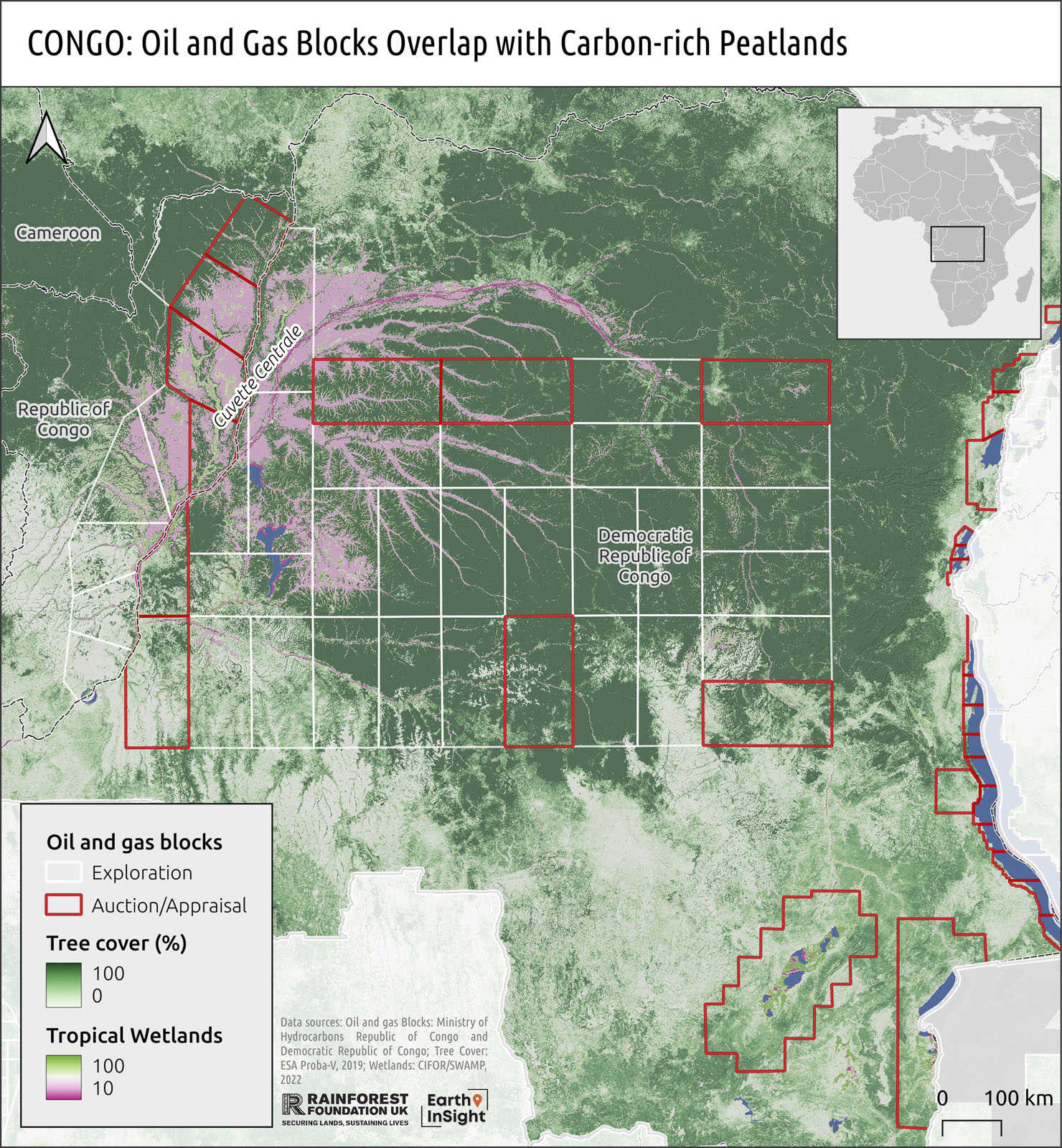
Groups working against oil in the Congo Basin: Appui aux Initiatives Communautaire de Protection de l'Environnement de Développement Durable (AICED), Congolese Centre des Technologies Innovatrices et le Développement Durable (CTIDD), Mouvement de Jeunes pour la protection de l’environnement (MJPE-RDC), Réseau pour la Conservation et la réhabilitation des écosystèmes forestiers (CREF), Innovation pour le Développement et la Protection de l'Environnement, Association des Jeunes Visionnaires RDC, Fossil Free Virunga, 350Africa.org, Greenpeace Africa, Rainforest Rescue, Extinction Rebellion République University of Goma, DRC, Synergy of Ecologists for Peace and Development (SEPD DRC), Solidarité pour la Réflexion et Appui au Développement Communautaire (SORADEC)
Sources: